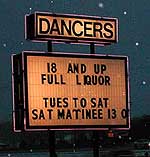The legal battle continues
By Erin Galbally
Minnesota Public Radio
March 4, 2002
|
| RealAudio |
The sex industry grows | Small towns react | The legal battle continues | Nicollet - the moral battleground | Exotic dance - is it art?
The First Amendment to the U.S. Constitution guarantees free speech and freedom of expression. Those protections extend to adult businesses. While pornography and strip clubs remain hot button issues, the legal debate has shifted. So has its location. The argument is no longer whether sex-oriented businesses can exist. Now, the question is how to regulate them legally, as strip clubs and adult bookstores move into small cities and towns.
| |
|
|
|
||
In 1973, the U.S. Supreme Court narrowly agreed on a definition for obscenity. In response, a leading opponent of the adult business industry declared pornography, sexually explicit speech, and adult entertainment would soon be left to history. Those predictions felt short. Instead, the sex industry has mushroomed into a multi-billion dollar enterprise.
No one knows that better than attorney Randall Tigue. Tigue has spent his legal career in courtrooms across the upper Midwest representing strippers, club owners and bookstore proprietors.
"The First Amendment is basically there to defend unpopular beliefs and causes, and that's what I do for a living," says Tigue.
Tigue got his start 20 years ago, defending Ferris Alexander, a well-known adult business entrepreneur. In the early 1990s, Alexander was successfully prosecuted under a tough anti-racketeering statute. His conviction ended his $11 million pornography empire. Alexander was sent to prison, and a new generation of entrepreneurs moved into Minnesota's sex industry.
As a result, Tigue's client list has grown substantially, to include virtually all of the newcomers. Despite his crusade on behalf of free speech, Tigue instructs his clients not to talk publicly about their businesses. But he is happy to explain why strip clubs have the right to exist.
"If you are offended by the presence of those in the neighborhood, frankly, there are people that are offended by the presence of Roman Catholic churches in their neighborhood, too. There are people who are offended by people of African-American heritage moving into the neighborhood, and the answer is you learn to live with it. That's a price of living in a diverse and free society," says Tigue.
| |
|
|
|
||
Opponents would say Tigue has craftily built his career hiding his clients behind the First Amendment. Those guarantees of free speech and freedom of expression mean adult businesses, bookstores or strip clubs, have a legal right to exist. As a result, opponents now put their faith in obscure zoning laws to restrict the growth of those businesses.
If Tigue's clients make up one side of the debate, local officials in St. Cloud, Winona, and Cannon Falls represent the other.
One of those is Robert Raupp, the Benton County attorney. Part of Raupp's job has been to design and defend ordinances that restrict the county's modest collection of adult enterprises. Raupp says he represents a conservative community where concerns over indecency easily become campaign issues.
"I think there's a greater groundswell of public opinion in favor of restricting public indecency in a predominantly rural county, than one would find in other counties," says Raupp.
In the early 1990s, Benton County adopted an ordinance designed to move a local strip club, the King's Inn, away from a residential area. Owners of the club responded by taking the county to court. The case is still pending and the club remains open.
|
"I think there's a greater groundswell of public opinion in favor of restricting public indecency in a predominantly rural county, than one would find in other counties."
- Benton County Attorney Robert Raupp |
More recently, Benton passed a regulation that prohibits nudity in public as well as some private places. That decision is also the subject of litigation. Raupp says it's no surprise that these actions have provoked controversy.
"In a zoning context, you cannot prohibit most of these First Amendment-protected activities. You can limit them, and you can restrict them where they are," says Raupp. "But it's much better for a municipality or local unit of government to look at these issues before they are forced to, because there's an adult use establishment in the area and citizens are complaining."
"When adult entertainment naturally reaches out into its market, people react by trying to censor it," says Randall Tigue.
"All of these anti-nudity ordinances and all of the zoning ordinances - while they purport to just be concerned with regulating the adverse secondary effects of adult businesses - are really just attempts to censor it. If you look at ordinance after ordinance, they are deliberately designed to make sure adult entertainment can't open," Tigue says.
Ultimately, communities can regulate - but cannot ban - strip clubs and adult bookstores from lining Main Street.
That's because it's illegal under the First Amendment to restrict speech or expression. So communities have come to rely on another strategy. They look to a series of studies that refer to the "negative secondary effects" of the sex industry.
These are studies that some say prove adult businesses diminish property values, and increase crime and prostitution. The courts have generally upheld the "secondary effects" rule, allowing government to regulate expression for the greater good of the community.
| |
|
|
|
||
Most places like Benton County rely on studies conducted in other locations - typically large metropolitan centers like Chicago, New York or Los Angeles. Adult industry lawyers argue data is not universal. A case pending before the U.S. Supreme Court is expected to answer that debate.
Right now, communities have had the most success when they combine zoning laws and the secondary effects argument. Benton County Attorney Robert Raupp says forcing communities to pay for a new round of studies will strip them of their most successful tool for regulation.
"Frequently you're dealing with smaller communities, rural counties. It's difficult for them to justify spending a lot of money an studies to support adult use regulations, and it doesn't make a lot of sense to them because all these other studies exist," Raupp says. "I think their line of logic is, 'Why should we waste the money and reinvent the wheel by doing this over again, particularly when the courts say we don't have to?'"
Tigue counters secondary effects are subjective. To be fair, there are studies on both sides of the issue. Tigue says at the end of the day - ordinance or no ordinance - ideas and thoughts can't be silenced.
"I'm kind of reminded of the movie Jurassic Park, when they decided they were going to make dinosaurs female so they can't reproduce, and Dr. Ian Malcolm says life will find a way. That's the same that's true with ideas and free expression. Ideas that people want will find a way, no matter what the government does," says Tigue.
The body of law that regulates adult entertainment continues to evolve, along with technology. A decision by the Supreme Court on sexually explicit speech on the Internet is forthcoming. That decision is expected to transform the debate over free speech and freedom of expression across the nation.



